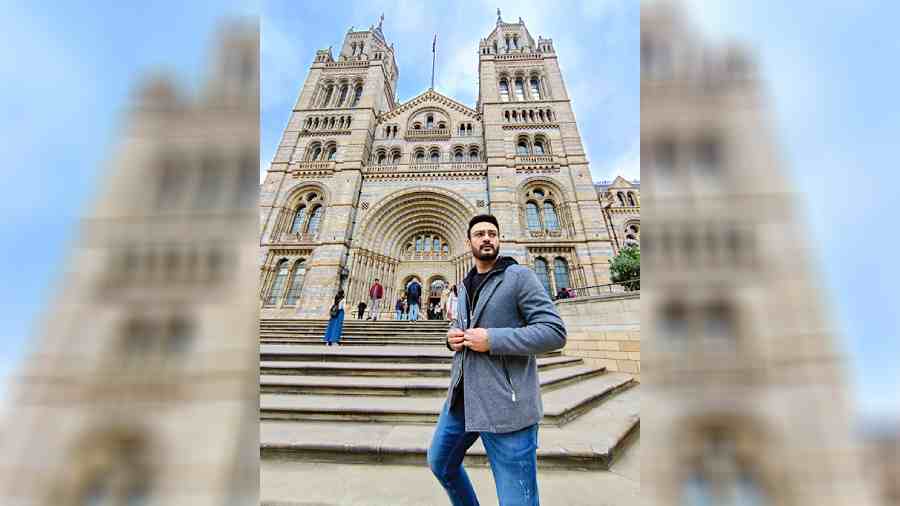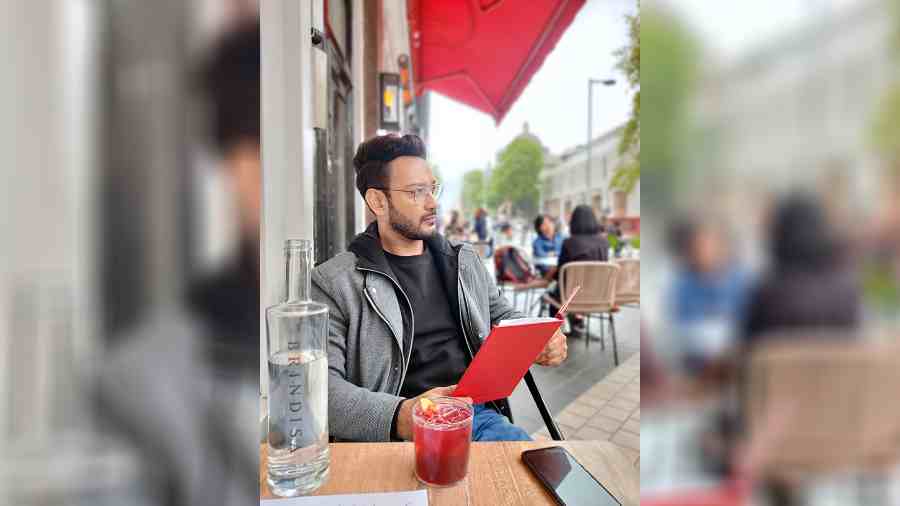Director Atanu Ghosh’s new feature film Aaro Ek Prithibi was released in the theatres on February 3. A thriller based on the concept of ‘home’, the film narrates an intriguing story shot with an ensemble cast far away from home, in London. Actor Shaheb Bhattacherjee who stars in the film takes The Telegraph through the shoot, the challenges of working in a foreign land, his love for thrillers and much more. Excerpts:
You have extensively worked in thriller as a genre. What do you love best about it?
The best thing about a thriller is it keeps the audience guessing what’s going to happen next, and the biggest challenge in a thriller is to prove the audience wrong and do something that the audience wasn’t expecting.
Does any artiste’s work in this genre inspire you?
Not really. I do not look for inspiration from anyone as I believe this is a creative form of media. And as an actor, it is my job to create. Apart from that, since there is so much thriller content on OTT, the major challenge is to make it look different and feel different.
Tell us about your character in Aaro Ek Prithibi?
My character’s name is Aritro. Aritro comes from a troubled past. His parents went to solve a dispute over property in the village and on their way back died on the spot. Aritro has believed all his life that his parents were murdered. After that, he takes a lot of wrong decisions in life and pays very dearly for them. Eventually, when he is working in London, he comes to another point in his life where he takes such a crucial decision to find a permanent place in London that that decision takes him to a do-or-die situation.
What is your experience of working in an Atanu Ghosh film?
I think the film in its own way has a way of unfolding. Atanuda is a director that I have always wanted to work with. I think, as a director, he gives a perfect vibe to the actor. One of the things that an actor looks forward to. And the film has a very different way of unfolding. These four characters are on the verge of being homeless and every moment they are struggling to survive. The audience keeps guessing what is going to happen next.
What was it like working with a cast with such diverse talents?
For the director, the work becomes a lot easier. (laughs) But for the actor, if I start thinking of Kaushik Ganguly as the actor Kaushik Ganguly or Tasnia as the actor Tasnia (Farin) from Ladies and Gentlemen, then it becomes difficult for the actor because it becomes like a competition with co-actors. But filmmaking is a complete team game. I looked at Kaushikda as the character in the film and similar to the others. So, it never came to mind that I am working with such great actors...what is going to happen!
The shoot happened in London. Were there any challenges during the shoot?
The challenges of the shoot were actually very funny. We all were living in London and Atanuda was with his camera roaming around shooting me, Kaushikda or Tasnia. Kaushikda played this homeless man and every time he would step out of the hotel, people used to think how is this homeless man staying in a hotel? He looked so authentic. One day he was sitting on a park bench and someone came and offered him food. We were all roaming around London and this is not the glitz and glam of London that we see. It is the dark underbelly of London. It was very different. There was this scene that I had to do where I was submerged in a bathtub and every time we had to do this scene, they used to fill up the bathtub with warm water, but the water used to turn ice cold again. I, being the overenthusiastic actor, jumped into the water and felt my heart was going to stop because the water was so cold.
Did you manage to go around the city?
It was a solo trip for me for the first time. When everyone else was shooting, I took public transport, got onto buses and got the apps to figure out which buses to use. I watched a lot of theatre in London this time and was completely blown away by it and was going around Oxford Street. It was a good experience and I visited the Natural History Museum. It was a very unique experience exploring London myself. I had friends but wanted to see how this works. Also, when my mother expressed concern before I went for my shoot, I used to joke and tell her that my name is Shaheb and I am going to my hometown. “You don’t need to worry about me, I will come back safe!” I had told her. So for me, it was a long holiday in my hometown! (Laughs).
Aaro Ek Prithibi emphasises the concept of home. What does home mean to you?
On the contrary, Aaro Ek Prithibi is about a certain concept of the home which does not necessarily signify the four walls. In the film, for certain characters, it is four walls. But other characters don’t want to be confined within the four walls. For one character, the definition of home is to stay in someone’s heart forever. In my life, home is where my heart is. I completely believe in this. It could be a lavish mansion or a two-bedroom flat but as long as my heart is there, it is home for me.

Do you feel homesick when you have to stay away from home for a long time or are you more of a wanderlust soul?
Wanderlust is too far-fetched for me! But not homesick. I have been to London before but this time it was different because I met a lot of people from different cultures and different language backgrounds. While pub hopping, I met a lot of South Americans, Latinos, African and Scottish people, whose accents I couldn’t understand! But meeting a lot of different people always enriches the actor’s experience. When we meet different people from different cultures, it always makes us realise how valid human emotion and imagination can be.
Your web series Swetkali is also releasing soon. How has the OTT space opened up for exploring your passion?
OTT platforms nationally are in a very good space but Bengal has to do better. I think they see it as a glorified version of television right now. I think content-wise it has a lot to explore. I think OTT has opened up a space for a lot of young people in the industry in terms of sound, camera and costume, which is the need of the hour in our industry right now. On OTT, since the corporate house mostly finances it, there is a chance that they can do the hit-and-trial process with young people and it can be regulated with the creative producers from the house.
Swetkali is a thriller too. What is the story?
It is a very interesting story. There is an old dilapidated house which is like a rajbari supposed to be turned into a hotel. Suddenly in one of the rooms, they find the idol of a white Kali which is very rare. It is white because it needs human sacrifice to turn into its dark colour; that is how the whole series starts, followed by murders. It has the correct concoction of thrill, religion and family drama.
Out of all your characters in the thriller genre, which one is your favourite?
It will be very difficult to choose. It will be very unfair to say this was one of my favourite characters and this was not. But there was a character called Chotka that I played. I think it was very challenging because I played a schizophrenic person. I had to do a lot of research on that character.
When you work in a genre for so long, you either get bored of it or catch on to it with a deeper passion for it. How has it been for you? What other genres would you like to explore as an actor?
I developed a deeper passion for it because thrillers are the only thing happening right now on OTT! You will hardly come across a rom-com or a period piece these days. Every Bengali in Calcutta feels they have become Feluda. Creators have to find different ways of presenting it to the audience. Situational comedy has been missing in the film circuit and OTT circuit for a long time. Ballabhpurer Roopkotha is a horror comedy. So, lots of new things are coming up.
Your films these days mostly have an ensemble cast. Are you comfortable acting in that space or do you ever wish to shoulder a film?
It depends on the director and the story. The director has to have enough faith in me. All these years I have worked as a lead. I have done very few character roles. But nowadays, the characters are more important than the actual cast. A Munna Bhai is as important as a Kaleen Bhaiya now. Importance is given to the character and the story. Even the smallest character has importance in OTT.
You are actively working in theatre as well. How do you divide up your time?
I think theatre is my passion. Theatre in Bengal is in a very deplorable condition. I have been talking about this. They still believe in the same old group theatre where you don’t need to earn money. They only do it for the sake of the art and to send the message across. But art does not provide an empty stomach. Just like it is said, when there is poverty, love flies out of the window... in this case, art flies out of the window! And I have been working for the last seven-eight years to improve it. Such talented guys come from the suburbs but there is so much politics in theatre these days. It is very difficult to get a hall these days. You have to have a source. So, it is a very deplorable condition, but it is the same platform that spoke about people’s daily lives at one point.










